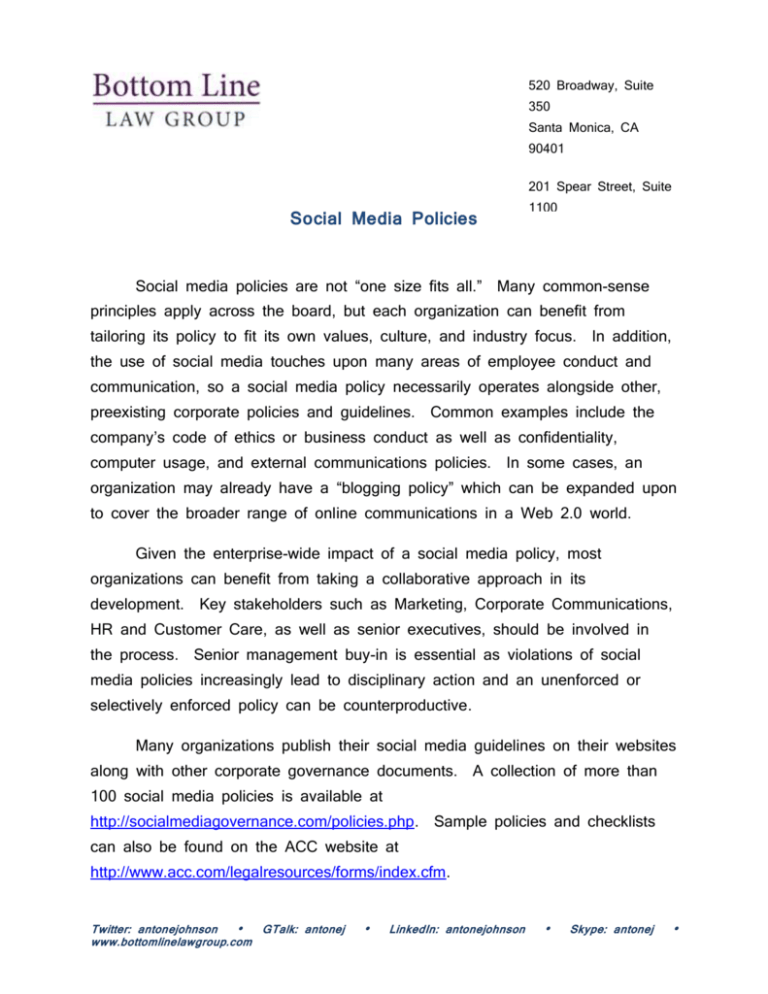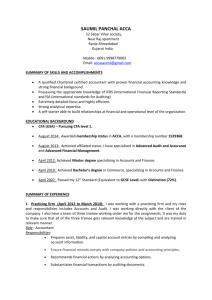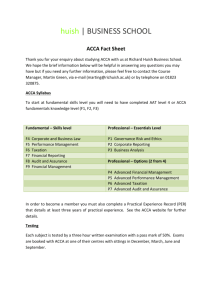Social Media Policy Template and Resources
advertisement

520 Broadway, Suite 350 Santa Monica, CA 90401 201 Spear Street, Suite 1100 Social Media Policies San Francisco, CA 94105 776-5484 Social media policies are not “one size fits all.” Many(310) common-sense 564-1795 fax principles apply across the board, but each organization can(310) benefit from AFJ@bottomlinelawgroup. tailoring its policy to fit its own values, culture, and industry com focus. In addition, the use of social media touches upon many areas of employee conduct and communication, so a social media policy necessarily operates alongside other, preexisting corporate policies and guidelines. Common examples include the company’s code of ethics or business conduct as well as confidentiality, computer usage, and external communications policies. In some cases, an organization may already have a “blogging policy” which can be expanded upon to cover the broader range of online communications in a Web 2.0 world. Given the enterprise-wide impact of a social media policy, most organizations can benefit from taking a collaborative approach in its development. Key stakeholders such as Marketing, Corporate Communications, HR and Customer Care, as well as senior executives, should be involved in the process. Senior management buy-in is essential as violations of social media policies increasingly lead to disciplinary action and an unenforced or selectively enforced policy can be counterproductive. Many organizations publish their social media guidelines on their websites along with other corporate governance documents. A collection of more than 100 social media policies is available at http://socialmediagovernance.com/policies.php. Sample policies and checklists can also be found on the ACC website at http://www.acc.com/legalresources/forms/index.cfm. Twitter: antonejohnson • GTalk: antonej www.bottomlinelawgroup.com • LinkedIn: antonejohnson • Skype: antonej • The following example is based on IBM’s Social Computing Guidelines, a widely cited template; the original can be found at http://www.ibm.com/blogs/zz/en/guidelines.html. IBM first adopted a set of blogging policies in 2005 and later expanded them to cover a broader range of social media. This document is available for download in PDF and editable Microsoft Word format from our website at http://bottomlinelawgroup.com/resources. Acca Corporation Social Media Guidelines Below are the current and official Acca Corporation Social Media Guidelines, which will continue to evolve as new communication platforms, tools and technologies become available. [Have you seen behavior or content that is not in keeping with these guidelines? Report inappropriate content via email.] Introduction Whether or not an employee chooses to create or participate in a blog, microblogging service, online social network or any other form of online publishing or discussion is his or her own decision. However, emerging online collaboration platforms are fundamentally changing the way employees work and engage with each other, customers, stakeholders and partners. Acca Corporation is increasingly exploring how online discourse can empower its people as global professionals, innovators and citizens. interactions represent a new model: communicators. These individual Not mass communications, but masses of Therefore, it is very much in the company’s interest—and, we believe, in each employee’s own—to be aware of and participate in this sphere of information, interaction and idea exchange. Executive Summary 1. Know and follow the Company’s Code of Business Conduct and Ethics. 2. Employees are personally responsible for the content they publish on social networking sites, microblogging services, review and rating sites, photo/video sharing services, e-commerce sites, social news/bookmarking sites, virtual worlds, blogs, wikis or any other form of user-generated media. Be mindful that what you publish will be public for a long time, perhaps in perpetuity; protect your privacy. 3. Write in the first person, identifying yourself—name and, when relevant, role at the Company—when you discuss Acca Corporation-related matters. You must make it clear that you are speaking for yourself and not on behalf of the Company. 4. If you publish content outside of the Company and it has something to do with work you do or subjects associated with the Company, use a disclaimer such as this: “The views on this site are my own and don’t necessarily represent those of Acca Corporation.” 5. Respect copyright, fair use and financial disclosure laws. 6. Don’t provide the Company’s or another’s confidential or proprietary information. Ask permission to publish or report on communications that are meant to be private or internal. 7. Don’t cite or reference customers, stakeholders without their approval. partners, suppliers or other When you do make a reference, where possible link back to the source. 8. Respect your audience. Don’t use ethnic slurs, personal insults, obscenity, or engage in any conduct that would not be acceptable in the workplace. You should also show proper consideration for others’ privacy and for topics that may be considered objectionable or inflammatory. 9. Find out who else is blogging or publishing on the topic, and cite them. 10. Be aware of your association with the Company in online social networks. If you identify yourself as a Company employee, ensure your 2 profile and related content is consistent with how you wish to present yourself to colleagues, customers, partners and suppliers. 11. Don’t pick fights, be the first to correct your own mistakes, and don’t alter previous posts without indicating that you have done so. 12. Try to add value. Provide worthwhile information and perspective. The Company’s brand is best represented by its people and what you publish online can either enhance or detract from it. Detailed Discussion The Acca Corporation Code of Business Conduct and Ethics and laws provide the foundation for these social media guidelines. The same principles and guidelines that apply to employees’ activities in general, as found in the Code of Business Conduct and Ethics, apply to employees’ activities online. This includes forms of online publishing and discussion, file sharing, user-generated video and audio, virtual worlds and social networks. Examples of social media include social networking sites (e.g., Facebook, LinkedIn, MySpace), microblogging services (Twitter), review and rating sites (Epinions, Yelp), social news/bookmarking sites (Delicious, Digg), photo/video sharing services (Flickr, Picasa, YouTube), e-commerce sites (Amazon, eBay), virtual worlds (Second Life), blogs, wikis or any other form of user-generated media. As outlined in the Code, Acca Corporation fully respects the legal rights of our employees. In general, what you do on your own time is your affair. However, activities in or outside of work that affect your job performance, the performance of others, or the Company’s business interests are a proper focus 3 for Company policy. Acca Corporation supports open dialogue and the exchange of ideas. The Company regards social media and other forms of online discourse as primarily a form of communication and relationship among individuals. When Acca Corporation wishes to communicate publicly as a company—whether to the marketplace or to the general public—it has well established means to do so. In keeping with our External Communications Policy, only those officially designated by Acca Corporation have the authorization to speak on behalf of the Company. However, Acca Corporation believes in dialogue among employees and with our partners, customers, stakeholders, members of the many communities in which we participate and the general public. We believe that our employees can both derive and provide important benefits from exchanges of perspective. As a company, Acca Corporation trusts—and expects—employees to exercise personal responsibility whenever they participate in social media. This includes not violating the trust of those with whom they are engaging. Company employees should not use these media for covert marketing or public relations. If and when members of our Corporate Communications, Marketing, Customer Care or other functions engaged in advocacy for the company have the authorization to participate in social media, they should identify themselves as such. What does an employee’s personal responsibility mean in online social media activities? Social media enable individuals to share their insights, express their opinions and share information within the context of a globally distributed conversation. Each tool and medium has proper and improper uses. While Acca Corporation encourages all of its employees to join a global conversation, 4 it is important for employees who choose to do so to understand what is recommended, expected and required when they discuss Company-related topics, whether at work or on their own time. Know the Acca Corporation Code of Business Conduct and Ethics. If you have any confusion about whether you ought to publish something online, chances are the Code will resolve it. the Code has to say about proprietary Pay particular attention to what information, misrepresentation and about competing in the field. about avoiding If, after checking the Code, you are still unclear as to the propriety of a particular communication, it is best to refrain and seek the advice of management. Be who you are. We believe in transparency and honesty. Some bloggers and contributors to social media work anonymously, using pseudonyms or false screen names. Acca Corporation discourages that in all forms of online participation that relate to the Company or issues with which it is engaged. If you are blogging about your work for the Company, we encourage you to use your real name, be clear who you are, and identify that you work for Acca Corporation. Nothing gains you more notice in the online social media environment than honesty—or dishonesty. If you have a vested interest in something you are discussing, be the first to point it out. privacy. But also be smart about protecting yourself and your What you publish will be around for a long time—perhaps in perpetuity—so consider the content carefully and be judicious in disclosing personal details. Be thoughtful about how you present yourself in online social networks. 5 The lines between public and private, personal and professional are blurred in online social networks. By virtue of identifying yourself as an Acca Corporation employee within a social network, you are now connected to your colleagues, managers and even customers. You should ensure that content associated with you is consistent with your work at the Company. If you recently joined Acca Corporation, be sure to update your social profiles to reflect our guidelines. Speak in the first person. Use your own voice; bring your own personality to the forefront; say what is on your mind. Use a disclaimer. Whether you publish to a blog or some other form of social media, make it clear that what you say there is representative of your views and opinions and not necessarily the views and opinions of the Company. At a minimum in your own blog, you should include the following standard disclaimer: “The postings on this site are my own and don’t necessarily represent the views of Acca Corporation.” Managers and executives take note: This standard disclaimer does not by itself exempt managers and executives from a special responsibility when using social media. By virtue of their position, they must consider whether personal thoughts they publish may be misunderstood as expressing Company positions. In addition, managers should assume that their teams will read what is written. A public blog, microblogging service or online social network is not the place to communicate policies, strategies or opinions to employees. 6 Respect copyright and fair use laws. For the Company’s protection as well as your own, it is critical that you show proper respect for the laws governing copyright and fair use of copyrighted material owned by others, including the Company’s own copyrights and brands. You should never quote more than short excerpts of someone else’s work. In general, it is good “netiquette” to link to others’ work rather than copying it. Keep in mind that laws will be different depending on where you live and work. When in doubt, consult the legal department for guidance on intellectual property issues. Protect confidential and proprietary information. Social media blur many of the traditional boundaries between internal and external communications. external platforms. Be thoughtful about what you publish, particularly on You must make sure you do not disclose or use Company confidential or proprietary information (or that of any other person or company) in social media. For example, ask permission before posting someone’s picture on a social networking site or publishing a conversation that was meant to be private. Avoid commenting on Company business performance. You must not comment on confidential Acca Corporation financial information such as future business performance, business plans, or prospects. includes statements about an upcoming quarter or information This about unannounced deals or strategic alliances, and applies to anyone including conversations with research analysts, press or other third parties. policy is not to comment on rumors in any way. Do not deny or affirm them— or suggest either denial or affirmation in subtle ways. 7 Company Rather, refer any inquiries to Corporate Communications. For more information, consult our External Communications Policy. Protect our customers, business partners, suppliers and other stakeholders. Customers, partners or suppliers should not be cited or obviously referenced without their approval. Externally, never identify a customer, partner or supplier by name without permission and never discuss confidential details of a transaction or business relationship. [Internal social computing platforms permit suppliers and business partners to participate, so be sensitive to who will see your content. If a client hasn’t given explicit permission for their name to be used, think carefully about the content you’re going to publish on any internal social media and get the appropriate permission where necessary.] Respect your audience and your coworkers. Remember that Acca Corporation is an organization whose employees and customers reflect a diverse set of customs, values and points of view. be afraid to be yourself, but do so respectfully. Don’t This includes not only the obvious (no ethnic slurs, personal insults, obscenity, etc.) but also proper consideration of privacy and of topics that may be considered objectionable or inflammatory. For example, if your blog or social media platform is hosted on a Company-owned property, avoid these topics and focus on subjects that are business-related. If it is self-hosted, use your best judgment and be sure to make it clear that the views and opinions expressed are yours alone and do not represent the official views of Acca Corporation. Further, blogs, social networking sites, microblogging services, wikis, virtual worlds, or other tools hosted outside of the Company’s protected Intranet environment should not be used for internal communications among fellow employees. It is fine for employees to disagree, but please don’t use online social media to air your 8 differences in an inappropriate manner. Add value. Acca Corporation’s brand is best represented by its people and everything you publish reflects upon it. Blogs and social media platforms that are hosted on Company-owned domains should be used in a way that adds value to our business. If it helps you, your coworkers, our customers or our partners to do their jobs and solve problems; if it helps to improve knowledge or skills; if it contributes directly or indirectly to the improvement of our products, processes and policies; if it builds a sense of community; or if it helps to promote the Company’s values, then it is adding value. Though not directly business- related, background information you choose to share about yourself, such as information about your family or personal interests, may be useful in helping establish a relationship between you and your readers, but it is entirely your choice whether to share this information. Don’t pick fights. When you see misrepresentations made about Acca Corporation by media, analysts or by other bloggers, you may certainly use your blog—or join someone else’s—to point that out. Always do so with respect, stick to the facts and identify your appropriate affiliation to the Company. Also, if you write about a competitor, you must make sure that what you say is factual and that it does not disparage the competitor. arguments. Avoid unnecessary or unproductive Brawls may earn traffic, but nobody wins in the end. Don’t try to settle scores or goad competitors or others into inflammatory debates. Here and in other areas of public discussion, make sure that what you are saying is factually correct. 9 Be the first to respond to your own mistakes. If you make an error, be up front about your mistake and correct it quickly. In a blog post, tweet or similar communication, if you choose to modify an earlier post, make it clear that you have done so. Use your best judgment. Remember that there are always consequences to what you publish. If you’re about to publish something that makes you even the slightest bit uncomfortable, review the suggestions above and think about why that is. If you’re still unsure, and it is related to Company business, feel free to discuss it with your manager. Ultimately, however, you have sole responsibility for what you publish in any form of social media. Recognize that you are legally liable for anything you write or present online. Company for commentary, Employees can be disciplined by the content, or images that are defamatory, pornographic, proprietary, harassing, libelous, or that can create a hostile work environment. You can also be sued by Company employees, competitors, and any individual or company that views your commentary, content, or images as defamatory, pornographic, proprietary, harassing, libelous or creating a hostile work environment. In December 2009, the Federal Trade Commission implemented regulations requiring bloggers and those who write online reviews to reveal if they have been compensated in any way—a free copy of a book, dinner, complementary admission—or have a relationship to a company, product or service they review. Already a “best practice” for most bloggers, such disclosure is now being enforced. Don’t forget your day job. 10 You should make sure that your online activities do not interfere with your job or commitments to customers. 11 Additional Resources A collection of more than 100 social media policies maintained by Chris Boudreaux: http://socialmediagovernance.com/policies.php. IBM Social Computing Guidelines: http://www.ibm.com/blogs/zz/en/guidelines.html. Compact, “Top 10” format social media policy by SHIFT Communications: http://www.shiftcomm.com/downloads/socialmediaguidelines.pdf Microsoft Corporation Tweeting and Blogging Guidelines: http://socialmediagovernance.com/MSFT_Social_Media_Policy.pdf IBM Virtual World Guidelines: http://domino.research.ibm.com/comm/research_projects .nsf/pages/virtualworlds.IBMVirtualWorldGuidelines.html Additional sample policies and checklists can be found on the ACC website at http://www.acc.com/legalresources/forms/index.cfm. A good resource about transparency in online communities is the Blog Council’s “Disclosure Best Practices Toolkit” at http://blogcouncil.org/disclosure/. The Code of Ethics established by the Word of Mouth Marketing Association (WOMMA) is available at http://www.womma.org/ethicscode.htm. This document is available for download in PDF and editable Microsoft Word format from our website at http://bottomlinelawgroup.com/resources. 2


